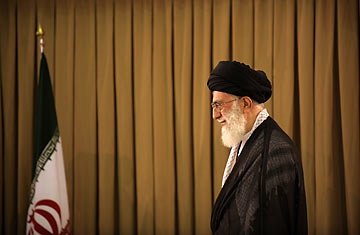
Iran's Supreme Leader Ayatullah Ali Khamenei
(2 of 2)
Khamenei became Iran's second Supreme Leader after Imam Khomeini died in 1989. As a midlevel cleric with little theological standing among his peers, he was in many ways an unlikely choice. Because he inherited the Imam's political powers but little of the religious authority, Khamenei tried to compensate by forging alliances with the security establishment, particularly among the commanders of the Revolutionary Guard and the Basij militia. That relationship has been central to the attempts to put down the uprising since June 20.
Khamenei has also exerted his influence on Iranian society through thousands of fatwas aimed at regulating everyday life. Although he is widely reported to like poetry and play an instrument, Khamenei ruled that music can cause deviant behavior and moral corruption among the young. Foreign news, he ruled, should be outlawed if it in any way "lessens trust in Islamic government," while he deemed neckties part of a "cultural assault" on Muslims. When riding bicycles or motorcycles, Khamenei ruled, women must avoid actions that lead to the wrong kind of attention. He sanctioned clapping on "joyful occasions" but forbade it where religion is involved. Nose piercings, while not forbidden, would have to be covered.
Some of Khamenei's micromanaging of the everyday was very practical: he condoned oral contraception for women and vasectomies for men to help bring down Iran's high birthrate. And he allowed stem-cell research and cloning, which led to the birth of Iran's first cloned sheep in 2006.
The Supreme Leader's traditional role has been to balance rival factions. Having aligned himself so closely with one political faction in a fiercely contested election, however, Khamenei's greatest challenge may now also come from some of his fellow clerics who have long questioned both the principle of a Supreme Leader as well as the role for the clergy in government.
In the current crisis, most of the senior Ayatullahs in the theological city of Qum have refrained from either endorsing Ahmadinejad's re-election or publicly supporting Khamenei's handling of the crisis. The diversity of opinion among Iran's clerics is reflected in Khamenei's younger brother Hadi, a cleric and former member of parliament who has long advocated cutting back the powers of the Supreme Leader.
"The most important thing we're looking for today in Iran is the rule of law," Hadi Khamenei said in 1999. "And that means no one, whatever his position, is above it. Unfortunately for the rest of us, there are still people at the top who don't accept that basic right."
Despite the challenge to his rule, Khamenei appears prepared to take an increasingly tough stand, leaving little room for retreat or political compromise and forcing him to rely even more heavily on both hard-line allies and Iran's security forces. The outcome of Iran's crisis is likely to affect his political standing as well as whoever ends up as President.
